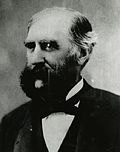This article relies largely or entirely on a single source .(November 2025) |
November 6, 1877 | |||||||||||||||||
| |||||||||||||||||
 County results McClellan: 40–50% 50–60% 60–70% Newell: 40–50% 50–60% | |||||||||||||||||
| |||||||||||||||||
| Elections in New Jersey |
|---|
 |
The 1877 New Jersey gubernatorial election was held on November 6, 1877. Democratic nominee George B. McClellan, who was the national Democratic Nominee in 1864, defeated Republican nominee William A. Newell with 51.65% of the vote.

